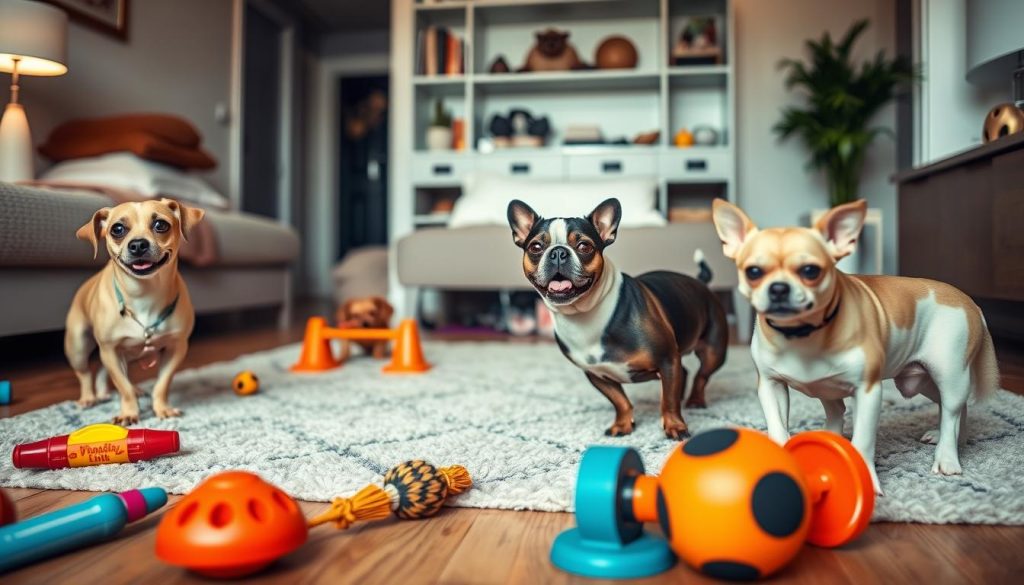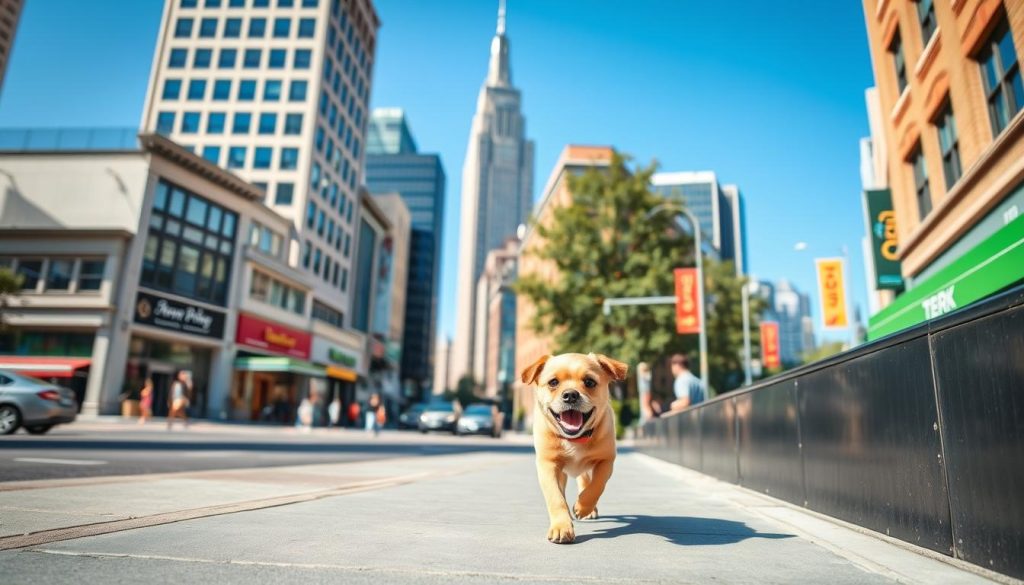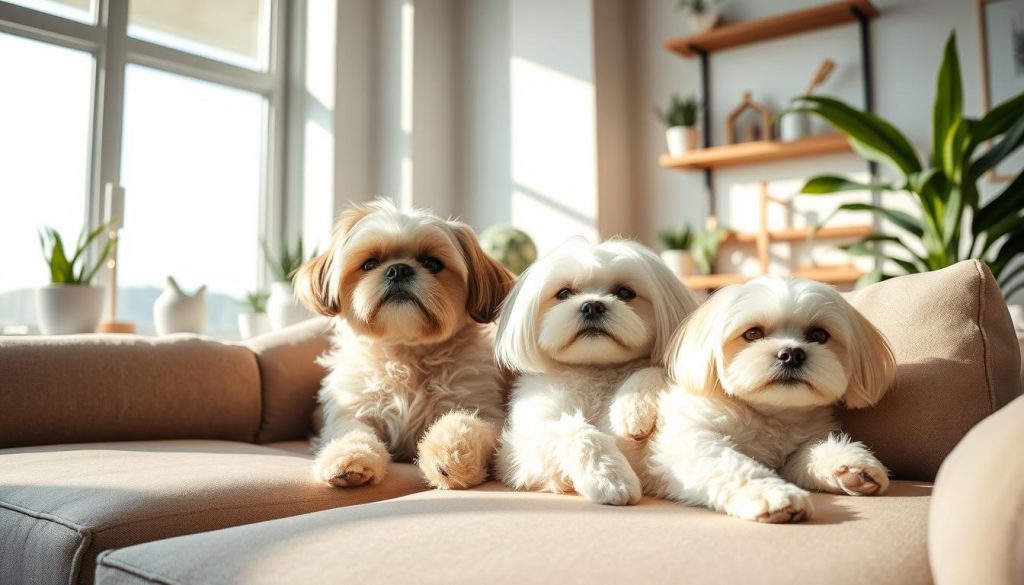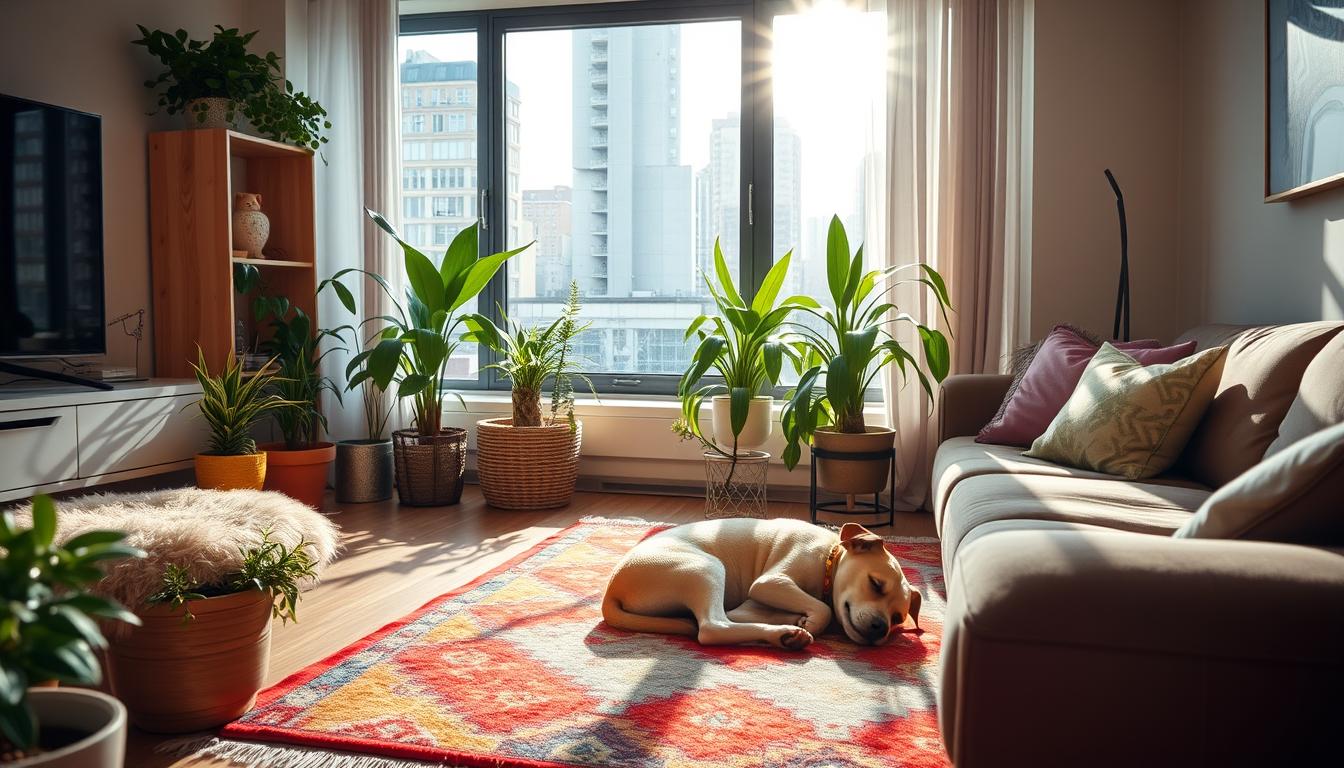Finding the right dog for city living can be tough. That’s why I’ve created this guide. It highlights the best small dog breeds for urban life and apartments. These dogs are perfect for busy people with small homes.
Choosing a small dog for city life means looking at their energy, grooming, and space needs. In this article, I’ll show you the top breeds for apartment pets. I’ll also share tips for keeping them happy and healthy in the city.
These small dog breeds are great for anyone, whether you’re new to dog ownership or looking to downsize. They’ll capture your heart and fit right into your city life. Let’s explore the joys of having a small dog in the city!
Why Small Dog Breeds are Perfect for City Life
If you live in a busy city with little space, a small dog might be just right for you. These tiny dogs are great for city living. They offer many benefits that make them perfect for city folks.
Limited Space Requirements
Small dog breeds are small, which is a big plus. They don’t need a lot of room, making them ideal for apartments or condos. Even in a small home, they have enough space to play and rest without feeling cramped.
Low Exercise Needs
Many small dog breeds have less energy than big dogs. They don’t need big yards or long walks to stay healthy. A few short walks or playtime in a park is enough for them.
Easy to Transport
City living means using public transport or walking through crowded streets. Small dog breeds are easy to carry, whether on the subway, in a taxi, or in your arms. Their size also lets them go into many pet-friendly places, so you can take them on adventures.
Remember, each small dog is different, with its own needs and personality. Some might bark more or need to go out more often. But with the right care and training, a small dog can be happy in the city. They bring love, friendship, and joy into your life.
Popular Small Dog Breeds
There are many small dog breeds that people love all over the world. These dogs are cute, friendly, and great for living in apartments. Let’s look at some of the most popular small dog breeds:
French Bulldog
The French Bulldog, or “Frenchie,” is a favorite among dog lovers. They are small but have big charm with their bat ears and wrinkled face. French Bulldogs are loving and fun, perfect for city living.
Pomeranian
Pomeranians are tiny but full of energy. They have big personalities and are always lively. Their thick fur comes in many colors, making them a great choice for apartments.
Yorkshire Terrier
The Yorkshire Terrier, or “Yorkie,” comes from England. They are small but full of spirit. Yorkies are smart, loyal, and loving, great for small homes. They also don’t make much hair, which is good for people with allergies.
For city living, the French Bulldog, Pomeranian, and Yorkshire Terrier are great choices. They are small, friendly, and easy to live with in apartments.
Factors to Consider When Choosing a Small Dog
Choosing a small dog involves several key factors. Your lifestyle, activity level, allergies, grooming needs, and the dog’s temperament and personality are all important. These elements help find the right furry friend for city living or apartment life.
Lifestyle and Activity Level
Think about your daily routine and how much time you can spend with your pet. Some small dogs need more exercise and play. If you’re busy or have little outdoor space, choose a breed with less energy, like a Cavalier King Charles Spaniel or a Pug.
Allergies and Grooming Needs
If allergies are a concern, pick a hypoallergenic breed. Dogs like the Bichon Frise or Maltese shed less and cause fewer allergies. Also, consider grooming needs. Long-haired breeds need more brushing and trimming to keep their coat looking good.
Temperament and Personality
Small dogs have different personalities. Some are spunky and outgoing, while others are calm and cuddly. Think about what kind of dog fits your lifestyle and preferences. For a lapdog, a Chihuahua or Shih Tzu might be perfect. For a more active friend, a Jack Russell Terrier or Miniature Schnauzer could be great.
By considering these factors, you’ll find the ideal small dog for your city or apartment lifestyle.
Training Tips for Small Dog Breeds
Training small dog breeds needs special strategies. They may be small, but they have big personalities. With the right approach, they can become well-behaved and adaptable city companions.

Socialization Strategies
Socializing your small dog is key for their happiness and city smarts. Start early by introducing them to many people, animals, and places in a positive way. Take them to puppy classes, dog-friendly parks, and arrange playdates with other small dogs.
This helps your pup build confidence and learn to interact well with others.
Positive Reinforcement Techniques
Positive reinforcement is vital for training small dog breeds. Use treats, praise, and toys to reward good behavior. This method strengthens your bond and encourages your dog to repeat good actions.
Avoid punishing or scolding your small dog. It can cause fear and anxiety. Instead, focus on redirecting bad behaviors and rewarding the good ones.
Remember, training small dog breeds requires consistency and patience. With the right socialization and positive reinforcement, your little city dweller will be well-mannered and confident soon.
Best Small Dog Breeds for Apartments
Looking for the perfect pet for your apartment? There are many small dog breeds that are great for small spaces. They are gentle, adaptable, and need only moderate exercise. Let’s look at two top picks for apartment living.
Cavalier King Charles Spaniel
The Cavalier King Charles Spaniel is a loving breed perfect for apartments. They are sweet, eager to please, and great for city living. These dogs are happy with short walks and playtime indoors, ideal for small spaces.
Dachshund
Dachshunds, or “wiener dogs,” are also great for apartments. Despite their small size, they have big personalities and are very loyal. They need some exercise but love to relax with you after a walk.
Choosing the right small dog breed for your apartment depends on your lifestyle and how much time you have for grooming and training. Both the Cavalier King Charles Spaniel and the Dachshund are perfect for apartment living. They are loving, adaptable, and make great companions for those living in smaller spaces.
The Importance of Daily Walks
As a small dog owner in the city, daily walks are key. Small dogs don’t need a lot of exercise, but walks are vital. They keep your dog healthy and happy. Let’s look at why walks are important and how to make them a regular part of your dog’s life.

Health Benefits for Small Dogs
Daily walks are great for small dogs. They help in many ways:
- Maintaining a healthy weight and preventing obesity
- Improving cardiovascular health and circulation
- Strengthening muscles, bones, and joints
- Promoting better digestion and reducing the risk of constipation
- Enhancing mental stimulation and reducing boredom-related behaviors
By walking your small dog every day, you’re helping them stay healthy and happy for years to come.
Creating a Routine
Having a regular walking schedule is good for you and your dog. Here are some tips to make it work:
- Choose a time that works for you, like morning or evening.
- Start with short walks and make them longer as your dog gets stronger.
- Use a comfy harness or leash that lets your dog move easily.
- Give your dog praise and treats during and after walks to make them happy.
- Keep to your routine, even when it’s busy or the weather is bad.
Daily walks do more than keep your dog healthy. They also help with socializing, mental health, and bonding. By making walks a priority, you ensure your small dog does well in the city.
Socializing Your Small Dog in Urban Environments
Socializing small dogs is key for their happiness and growth, especially in cities. City life gives your dog chances to meet other dogs and see new things. By showing your dog different places and people, they’ll become more confident and friendly.
Parks and Outdoor Spaces
Parks and outdoor areas are great for socializing small dogs in cities. These places let your dog run, play, and meet other dogs. Use off-leash areas where your dog can play with others safely. Always clean up after your dog to keep the area nice for everyone.
Meeting Other Dogs
It’s important to introduce your small dog to other dogs. Start with playdates with dogs that are friendly and the same size. Meeting different dogs helps your dog learn social skills and feel more confident. Go to dog events to help your dog meet new friends in a safe place.
When socializing your small dog, always think about their safety and happiness. Watch how your dog acts and step in if they seem scared or stressed. Positive rewards like treats and praise make socializing a good thing for your dog. With patience and regular practice, your small dog will love city life and make friends easily.
Dealing with Noise Sensitivity
Living in a busy city can be tough for small dogs, especially those who get scared by noise. The sounds of cars, construction, and city life can stress them out. It’s important for dog owners to know if their pet is sensitive to noise and make their home calm.

Calming Techniques for Noise-Sensitive Dogs
If your small dog gets scared by loud noises, there are ways to help them feel better:
- Create a safe space: Pick a quiet spot in your home for your dog to go when they’re stressed. This could be a crate or a cozy bed in a room that’s not busy.
- Use white noise: A fan, a white noise machine, or a TV on low can help block out loud sounds. This makes your dog’s home quieter and more peaceful.
- Provide comfort items: Give your dog a favorite toy or blanket. These things remind them of safety and comfort. The smell and feel of them can help them relax.
Quiet Breeds for City Living
When picking a small dog for city life, think about their noise sensitivity. Breeds like the Shih Tzu and Maltese are often less scared of loud noises. These dogs are gentle and can do well in cities with the right training and socialization.
Choosing a quiet breed and using calming methods can make city life easier for your small dog. They’ll feel more comfortable and at ease.
Finding Pet-Friendly Housing
Looking for a new home in the city with your small dog? Finding pet-friendly housing is key. It might seem hard, but with some effort, you can find the right place for you and your pet.
Begin by looking for apartments that welcome pets. Many websites let you filter by pet policies. Remember, some places might not allow certain breeds, like Miniature Schnauzers or Pugs.
Tips for Apartment Hunting
- Be ready to pay pet deposits or extra monthly fees. Many landlords charge these for pet-friendly units.
- Have references from past landlords or neighbors who can speak to your dog’s good behavior.
- Make a “pet resume” with your dog’s training, temperament, and any certifications.
Questions to Ask Landlords
When you find an apartment, ask the landlord about their pet policies:
- Are there breed or size limits?
- Is there a pet limit?
- Are there pet-friendly amenities, like dog runs or parks, in the building or nearby?
By being proactive and detailed in your search, you’ll find the perfect pet-friendly home for you and your small dog.
Resources for Small Dog Owners
As a small dog owner in the city, having support is key. Whether your dog is a Boston Terrier, Chihuahua, or another small breed, local trainers and online communities are crucial. They help you face the unique challenges of city pet ownership.
Local dog trainers are experts in small breeds. They offer advice on potty training in tight spaces and managing barking and anxiety. They create a training plan that fits your dog’s needs and personality, making your dog a happy and well-behaved member of your home.
Online Communities and Support Groups
Online communities and support groups are also great resources. They connect people from all over who face the same joys and challenges of raising small dogs in cities. You can ask questions, share advice, and find others who understand the city life with a small dog.
Having access to local trainers and online support groups is vital. They ensure you and your dog thrive in the city. With some research and outreach, you’ll find a wealth of knowledge and support for urban small dog ownership.

